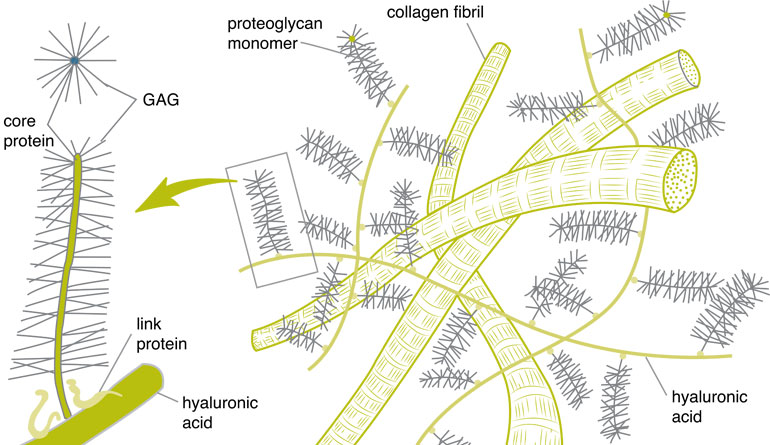


 النبات
النبات
 الحيوان
الحيوان
 الأحياء المجهرية
الأحياء المجهرية
 علم الأمراض
علم الأمراض
 التقانة الإحيائية
التقانة الإحيائية
 التقنية الحيوية المكروبية
التقنية الحيوية المكروبية
 التقنية الحياتية النانوية
التقنية الحياتية النانوية
 علم الأجنة
علم الأجنة
 الأحياء الجزيئي
الأحياء الجزيئي
 علم وظائف الأعضاء
علم وظائف الأعضاء
 الغدد
الغدد
 المضادات الحيوية
المضادات الحيوية|
أقرأ أيضاً
التاريخ: 14-12-2015
التاريخ: 4-12-2019
التاريخ: 29-11-2018
التاريخ: 25-12-2015
|
Collagen proteoglycans gene
Genes in this group provide instructions for making the protein component of large molecules called collagen proteoglycans. A proteoglycan is a molecule that is made up of a core protein attached to one or more sugar molecules called glycosaminoglycan (GAG) chains.
The collagen proteoglycans gene group is a subset of a larger gene group known as the proteoglycan supergroup. The many different types of proteoglycans are classified according to their core protein. The core protein produced by members of the collagen proteoglycans gene group is collagen. Collagens are a group of proteins that strengthen and support connective tissues, such as skin, bone, cartilage, tendons, and
ligaments. Collagen proteoglycans are major components of the extracellular matrix, which is an intricate lattice of proteins and other molecules that forms in the spaces between cells. The collagen proteoglycans bind to a variety of other proteins in the extracellular matrix, including other forms of collagen. Examples of genes in this gene group: COL9A1, COL9A2, COL9A3
The HUGO Gene Nomenclature Committee (HGNC) provides an index of gene groups (https://www.genenames.org/data/genegroup/#!/group/575) and their member genes.
References
Amenta PS, Scivoletti NA, Newman MD, Sciancalepore JP, Li D, Myers JC. Proteoglycan-collagen XV in human tissues is seen linking banded collagen fibers subjacent to the basement membrane. J Histochem Cytochem. 2005 Feb;53(2):165-76. PubMed 15684329 (https://www.ncbi.nlm.nih.gov/ pubmed/15684329).
Iozzo RV, Schaefer L. Proteoglycan form and function: A comprehensive nomenclature of proteoglycans. Matrix Biol. 2015 Mar;42:11-55. doi: 10.1016/ j.matbio.2015.02.003. Epub 2015 Feb 18. Review. PubMed PMID: 25701227 (https://www.ncbi.nlm.nih.gov/pubmed/25701227). Free full text from PubMed Central: PMC4859157 (https://www.ncbi.nlm.nih.gov/pmc/articles/ PMC4859157/).
Li D, Clark CC, Myers JC. Basement membrane zone type XV collagen is a disulfide-bonded chondroitin sulfate proteoglycan in human tissues and cultured cells. J Biol Chem. 2000 Jul 21;275(29):22339-47. PubMed: 10791950 (https:// www.ncbi.nlm.nih.gov/pubmed/10791950).
van der Rest M, Mayne R. Type IX collagen proteoglycan from cartilage is covalently cross-linked to type II collagen. J Biol Chem. 1988 Feb 5;263(4):1615-8. PubMed: 3123475 (https://www.ncbi.nlm.nih.gov/ pubmed/3123475).




|
|
|
|
5 علامات تحذيرية قد تدل على "مشكل خطير" في الكبد
|
|
|
|
|
|
|
لحماية التراث الوطني.. العتبة العباسية تعلن عن ترميم أكثر من 200 وثيقة خلال عام 2024
|
|
|